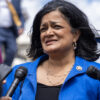In the third and last presidential debate before the November election, President Obama will be challenged on his foreign policy credentials. Defending his foreign policy track record will be no easy task.
After almost four years of his presidency, not only is America’s standing in the world weaker; the world is also more dangerous than before.
Obama has not made his view of America’s role in the world a secret. As The Heritage Foundation has previously pointed out, from the very beginning, arguably even before taking office, President Obama began laying out the tenets of a doctrine that would enable his Administration to remake America as one nation among many, with no singular claim to responsibility or exceptionalism.
In sum, the Obama Doctrine is a policy of leading from behind in global affairs, presiding over dangerous defense cuts that leave America weaker in a more dangerous world, and placing “hope” above reality when dealing with countries like Russia, Iran, China, and North Korea—each presenting unique threats to America’s interests.
The failed outcomes of the Obama Doctrine can be seen across a number of foreign policy challenges that the Administration has faced.
Russian “Reset.” For example, Russia and the so-called “reset” in relations. Since the announcement of the “reset” in 2009, we have seen a 21st-century Russia with 19th-century ambitions—simply look at Georgia, where Russian troops still occupy 20 percent of Georgia’s territory four years after invading it. The Administration pandered to Russian concerns and changed its missile defense plans for a “third site” in Poland and the Czech Republic.
Russia made it extremely difficult to pass a U.N. Security Council resolution on Libya in 2011 and continues to block all international efforts to stop the bloodshed in Syria—even while supplying the Syrian regime with weaponry. More recently, Moscow brought an end to all USAID programs inside Russia and closed down Radio Liberty.
Arab Spring. America has not fared much better as a result of Obama’s reaction to the Arab Spring. Obama has taken a “leading from behind” approach, which is having disastrous results to America’s interests in the region. After the Administration hastily called for Egyptian President Hosni Mubarak to step down, the Muslim Brotherhood is now in power in Egypt, and Israel’s peace and security is threatened from terrorism in the Sinai. Islamist parties now play a role they never experienced before in Tunisian politics, and the Administration is all but in a state of paralysis over Syria.
Al-Qaeda. Although Osama bin Laden is currently sitting at the bottom of the Arabian Sea, the inconvenient truth for the Administration is that al-Qaeda is very much alive and active—especially on the Arabian Peninsula and across northern Africa. This was most vividly demonstrated on September 11, 2012, when the U.S. Ambassador to Libya, Christopher Stevens, and three other brave Americans were murdered in Benghazi by terrorists with suspected links to al-Qaeda.
Iran. In addition, Iran has never been closer to acquiring a nuclear weapon. Despite financial sanctions, U.S. exports to Iran have actually increased by one-third since last year alone. Israel and the Gulf states—both in Iran’s crosshairs—feel threatened by the Iranian regime but are unsure of America’s resolve in the Middle East. A nuclear-armed Iran would spark an arms race in one of the world’s most dangerous regions—not a legacy any President would want to leave behind.
As Heritage’s Kim Holmes and James Carafano have written:
The tenets of the Obama Doctrine…do not suit either this geopolitical reality or someone who believes in America’s obligation and ability to lead. Rather, they suit someone who believes he is managing America’s decline in a “post-American” world. They do not reflect history or the threats we face. They will serve to undermine America’s strengths and make it more difficult for friends and allies to figure out where we stand or how we might act in critical times. Ultimately, the Obama Doctrine will force friendly nations to look elsewhere, not to Washington, for arrangements that bring them greater security. And that will make this a far more dangerous world indeed.



























